Media Reflects Power Shift away from Producers to Consumers—Glimpses of Consumer Empowerment
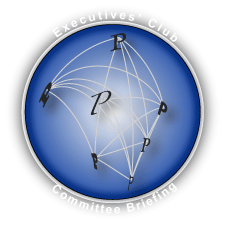 The Executives’ Club of Chicago assembled a visionary panel to give Midwest business leaders their advice for media communications in the (“new” ,^) digital age. Rishad Tobaccowala, CEO, Denuo Group and Chief Innovation Officer, Publicis; Dr. Jim Taylor, Vice Chairman, The Harrison Group and Emily L. Barr, President & General Manager, ABC 7 Chicago were panelists, and Susan D. Whiting, Chairman, Nielsen Media Research moderated the breakfast, which took place 30 January 2007 at Chicago’s Mid-America Club. The Executives’ Club of Chicago assembled a visionary panel to give Midwest business leaders their advice for media communications in the (“new” ,^) digital age. Rishad Tobaccowala, CEO, Denuo Group and Chief Innovation Officer, Publicis; Dr. Jim Taylor, Vice Chairman, The Harrison Group and Emily L. Barr, President & General Manager, ABC 7 Chicago were panelists, and Susan D. Whiting, Chairman, Nielsen Media Research moderated the breakfast, which took place 30 January 2007 at Chicago’s Mid-America Club.
Ours is rapidly becoming a P2P world in which individuals communicate with individuals digitally, and this represents a profound shift for media companies, their clients and everyone’s customers. The focus of the morning discussion was “media”—television, print, radio—which are still largely organized to deliver one message to an audience of many. Of course, the “mass” has always been comprised of individuals, but their alternatives to mass media have been few until fairly recently. Now they are tuning out mass messaging in favor of more relevant communications, which increasingly come from—other individuals. Meantime, people are increasingly connected via the Internet (whether through mobile […]
An Excellent Primer for the Core Competency of the 21st Century
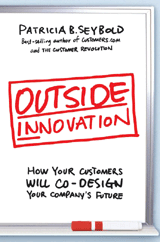 To thrive in the Knowledge Economy, companies will have to learn how to innovate at warp speed, or they will simply slip beneath the surface of the water like stricken liners. Ultra low costs and exceptional quality feature sets are merely expected, and they no longer differentiate. To thrive in the Knowledge Economy, companies will have to learn how to innovate at warp speed, or they will simply slip beneath the surface of the water like stricken liners. Ultra low costs and exceptional quality feature sets are merely expected, and they no longer differentiate.
Conventional wisdom holds that “innovation” cycles reappear every five years, when companies have exhausted the then-current cost-cutting approaches and need to focus on driving the top line.
However, the Knowledge Economy doesn’t call for your father’s innovation. The 21st century kind will require that companies turn themselves inside-out. Winners will learn to engage and catalyze their customers’ creativity. As author Patty Seybold aptly puts it, “Companies with the smartest customers win.” Outside Innovation is an in-the-trenches manual for evolving your company to embrace the innovation imperative.
[…]
We Must Rethink Learning in the Knowledge Economy
 Academicians everywhere are struggling to improve their students’ competitive standings in the global Knowledge Economy, which levels the playing field in many respects. It is far easier to build a world-class competitor in the Knowledge Economy than it was in the Industrial Economy. A strong educational system is a must, along with a highly motivated population, decent infrastructure and incentives for foreign investment. In former times, being a world competitor necessitated gaining control of vast natural resources to produce a strong industrial base from which world-class armies and navies would be built. India currently exemplifies the Knowledge Economy model very well*, and countries worldwide have taken note. Academicians everywhere are struggling to improve their students’ competitive standings in the global Knowledge Economy, which levels the playing field in many respects. It is far easier to build a world-class competitor in the Knowledge Economy than it was in the Industrial Economy. A strong educational system is a must, along with a highly motivated population, decent infrastructure and incentives for foreign investment. In former times, being a world competitor necessitated gaining control of vast natural resources to produce a strong industrial base from which world-class armies and navies would be built. India currently exemplifies the Knowledge Economy model very well*, and countries worldwide have taken note.
However, the Knowledge Economy is drastically changing what people need to learn to succeed, and educators haven’t caught up yet. They are teaching according to Industrial Economy rules, which compromises the performance of their students.
Educators have a special opportunity to create competitive advantage by realizing that the learning proposition is far different today—due to the Knowledge Economy and the role of information in adding value. The speed […]
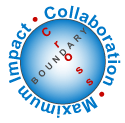 Two recent articles show that even the most intractable problems can be overcome when organizations find ways to align their goals. Sometimes collaboration makes for strange bedfellows—like the military and environmentalists—but opportunity is often highest when when “mashing up” groups that are not used to working together. Innovation can produce surprising value when leaders open their minds, challenge conventional wisdom and make unthinkable changes—like paying a hospital more for treating patients less. Two recent articles show that even the most intractable problems can be overcome when organizations find ways to align their goals. Sometimes collaboration makes for strange bedfellows—like the military and environmentalists—but opportunity is often highest when when “mashing up” groups that are not used to working together. Innovation can produce surprising value when leaders open their minds, challenge conventional wisdom and make unthinkable changes—like paying a hospital more for treating patients less.
These stories are as inspiring as they are instructive because the people involved questioned assumptions, and I hope you enjoy them.
Healthcare Costs Hit in Solar Plexus
Virginia Mason Medical Center is Seattle’s third largest health care provider, and it began innovating in several areas after receiving a wake-up call from Aetna, one of the area’s largest insurers. In 2004, Aetna shared the results of a study that compared treatment costs of Seattle area hospitals. Several of Virginia Mason’s specialty practices were significantly more costly than alternatives, and Aetna was considering excluding those areas from coverage. In the ensuing two years, Virginia Mason innovated by using new workflow strategies in targeted treatment areas. For example:
In the spine clinic, […]
Economic Outlook for 2007 Reveals Pockets of Opportunity + Political Handicapping
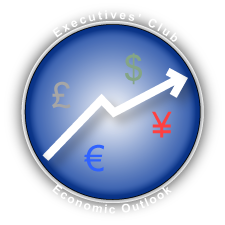 The Executives’ Club of Chicago assembled an all-star panel to give Midwest business leaders their guidance for various aspects of the U.S. economy in 2007. Diane Swonk, Chief Economist of Mesirow Financial, Alan Murray, Assistant Managing Editor of The Wall Street Journal and Robert “Bob” Froehlich, Chairman of the Investment Strategy Committee, Deutsche Asset Management broke out their respective crystal balls for 2007, and the audience was not disappointed for lack of insight or wit. The session was scintillatingly moderated by Terry Savage, Financial Columnist of the Chicago Sun-Times. The Executives’ Club of Chicago assembled an all-star panel to give Midwest business leaders their guidance for various aspects of the U.S. economy in 2007. Diane Swonk, Chief Economist of Mesirow Financial, Alan Murray, Assistant Managing Editor of The Wall Street Journal and Robert “Bob” Froehlich, Chairman of the Investment Strategy Committee, Deutsche Asset Management broke out their respective crystal balls for 2007, and the audience was not disappointed for lack of insight or wit. The session was scintillatingly moderated by Terry Savage, Financial Columnist of the Chicago Sun-Times.
The consensus was that the U.S. economy would have a relatively benign year in 2007. All panelists predicted a higher Dow, and their predictions concurred with Wall Street’s most accurate ,^) indicator, the Super Bowl Predictor. Little of import will happen on the political front, the U.S. economy will grow at a slower pace, and investment returns will be generally highest outside the U.S. Elsewhere, consumer empowerment reared its head in the executive pay issue, […]
China Analysis and Outlook 2007 offers political insight into the global knowledge market.
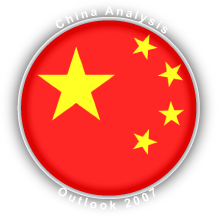 The Strategic Management Association, the Harvard Business School and the CDMA sponsored the 2007 China Outlook, which was given by Lyric Hughes-Hale, Founder China Online in Chicago 9 January 2007. Her presentation was preceded by David Hale’s 2007 Economic Forecast. The Strategic Management Association, the Harvard Business School and the CDMA sponsored the 2007 China Outlook, which was given by Lyric Hughes-Hale, Founder China Online in Chicago 9 January 2007. Her presentation was preceded by David Hale’s 2007 Economic Forecast.
As a long-time China watcher and analyst, Lyric has rare and unusual insights to which I’ll try to do justice before giving my observations. The Global Human Capital Journal also covered the 2006 China Outlook.
[…]
Economic Insight Behind the Global Knowledge Market
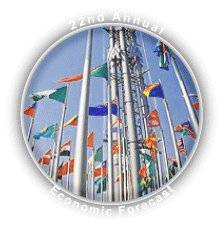 The Strategic Management Association, the Harvard Business School and the CDMA sponsored the 2007 Economic Forecast featuring David Hale, Chairman of Prince Street Capital Management and Lyric Hughes-Hale, Founder China Online. David has international renown as an international economist, and he presented his encyclopedic knowledge and perspective on global economic trends in Chicago on 9 January 2007. Afterward, Lyric shared her insights on China in Part II of the evening. The Global Human Capital Journal also covered the 2006 Economic Forecast. The Strategic Management Association, the Harvard Business School and the CDMA sponsored the 2007 Economic Forecast featuring David Hale, Chairman of Prince Street Capital Management and Lyric Hughes-Hale, Founder China Online. David has international renown as an international economist, and he presented his encyclopedic knowledge and perspective on global economic trends in Chicago on 9 January 2007. Afterward, Lyric shared her insights on China in Part II of the evening. The Global Human Capital Journal also covered the 2006 Economic Forecast.
David’s forecast was global in scope but adapted to his U.S. audience. It reflected many of the numbers behind the global shift to the Knowledge Economy, and how this is driving global prosperity:
[…]
 Chinese Prescription for Healthcare Providers predicts that China is showing itself to be very innovative in health care by implementing market-based offerings. The TEDA International Cardiovascular Hospital, just outside Beijing, offers six levels of service, ranging from $6.70 to $3,200 per night, as reported in “Hospital Caters to China’s Wealthy and Poor” in The Wall Street Journal or the hospital website. The lowest class of service has patients sharing a small room with other patients while “first class” includes a suite with a private gym, a garden, massage chair and other amenities. Chinese Prescription for Healthcare Providers predicts that China is showing itself to be very innovative in health care by implementing market-based offerings. The TEDA International Cardiovascular Hospital, just outside Beijing, offers six levels of service, ranging from $6.70 to $3,200 per night, as reported in “Hospital Caters to China’s Wealthy and Poor” in The Wall Street Journal or the hospital website. The lowest class of service has patients sharing a small room with other patients while “first class” includes a suite with a private gym, a garden, massage chair and other amenities.
China has an aging population of 1.3 billion to whom the government is struggling to provide health care. It regulates the prices of medicine and subsidizes basic services at public hospitals, but most people do not have western-type insurance and end up paying a major portion of their health care. The stakes are high today to solve the health care problem, and they are getting higher as the population ages.
[…]
|
|
 The Executives’ Club of Chicago assembled a visionary panel to give Midwest business leaders their advice for media communications in the (“new” ,^) digital age. Rishad Tobaccowala, CEO, Denuo Group and Chief Innovation Officer, Publicis; Dr. Jim Taylor, Vice Chairman, The Harrison Group and Emily L. Barr, President & General Manager, ABC 7 Chicago were panelists, and Susan D. Whiting, Chairman, Nielsen Media Research moderated the breakfast, which took place 30 January 2007 at Chicago’s Mid-America Club.
The Executives’ Club of Chicago assembled a visionary panel to give Midwest business leaders their advice for media communications in the (“new” ,^) digital age. Rishad Tobaccowala, CEO, Denuo Group and Chief Innovation Officer, Publicis; Dr. Jim Taylor, Vice Chairman, The Harrison Group and Emily L. Barr, President & General Manager, ABC 7 Chicago were panelists, and Susan D. Whiting, Chairman, Nielsen Media Research moderated the breakfast, which took place 30 January 2007 at Chicago’s Mid-America Club.
 To thrive in the Knowledge Economy, companies will have to learn how to innovate at warp speed, or they will simply slip beneath the surface of the water like stricken liners. Ultra low costs and exceptional quality feature sets are merely expected, and they no longer differentiate.
To thrive in the Knowledge Economy, companies will have to learn how to innovate at warp speed, or they will simply slip beneath the surface of the water like stricken liners. Ultra low costs and exceptional quality feature sets are merely expected, and they no longer differentiate. Academicians everywhere are struggling to improve their students’ competitive standings in the global Knowledge Economy, which levels the playing field in many respects. It is far easier to build a world-class competitor in the Knowledge Economy than it was in the Industrial Economy. A strong educational system is a must, along with a highly motivated population, decent infrastructure and incentives for foreign investment. In former times, being a world competitor necessitated gaining control of vast natural resources to produce a strong industrial base from which world-class armies and navies would be built. India currently exemplifies the Knowledge Economy model very well*, and countries worldwide have taken note.
Academicians everywhere are struggling to improve their students’ competitive standings in the global Knowledge Economy, which levels the playing field in many respects. It is far easier to build a world-class competitor in the Knowledge Economy than it was in the Industrial Economy. A strong educational system is a must, along with a highly motivated population, decent infrastructure and incentives for foreign investment. In former times, being a world competitor necessitated gaining control of vast natural resources to produce a strong industrial base from which world-class armies and navies would be built. India currently exemplifies the Knowledge Economy model very well*, and countries worldwide have taken note. Two recent articles show that even the most intractable problems can be overcome when organizations find ways to align their goals. Sometimes collaboration makes for strange bedfellows—like the military and environmentalists—but opportunity is often highest when when “mashing up” groups that are not used to working together. Innovation can produce surprising value when leaders open their minds, challenge conventional wisdom and make unthinkable changes—like paying a hospital more for treating patients less.
Two recent articles show that even the most intractable problems can be overcome when organizations find ways to align their goals. Sometimes collaboration makes for strange bedfellows—like the military and environmentalists—but opportunity is often highest when when “mashing up” groups that are not used to working together. Innovation can produce surprising value when leaders open their minds, challenge conventional wisdom and make unthinkable changes—like paying a hospital more for treating patients less. The Executives’ Club of Chicago assembled an all-star panel to give Midwest business leaders their guidance for various aspects of the U.S. economy in 2007. Diane Swonk, Chief Economist of Mesirow Financial, Alan Murray, Assistant Managing Editor of The Wall Street Journal and Robert “Bob” Froehlich, Chairman of the Investment Strategy Committee, Deutsche Asset Management broke out their respective crystal balls for 2007, and the audience was not disappointed for lack of insight or wit. The session was scintillatingly moderated by Terry Savage, Financial Columnist of the Chicago Sun-Times.
The Executives’ Club of Chicago assembled an all-star panel to give Midwest business leaders their guidance for various aspects of the U.S. economy in 2007. Diane Swonk, Chief Economist of Mesirow Financial, Alan Murray, Assistant Managing Editor of The Wall Street Journal and Robert “Bob” Froehlich, Chairman of the Investment Strategy Committee, Deutsche Asset Management broke out their respective crystal balls for 2007, and the audience was not disappointed for lack of insight or wit. The session was scintillatingly moderated by Terry Savage, Financial Columnist of the Chicago Sun-Times. The Strategic Management Association, the Harvard Business School and the CDMA sponsored the 2007 China Outlook, which was given by Lyric Hughes-Hale, Founder China Online in Chicago 9 January 2007. Her presentation was preceded by David Hale’s 2007 Economic Forecast.
The Strategic Management Association, the Harvard Business School and the CDMA sponsored the 2007 China Outlook, which was given by Lyric Hughes-Hale, Founder China Online in Chicago 9 January 2007. Her presentation was preceded by David Hale’s 2007 Economic Forecast. The Strategic Management Association, the Harvard Business School and the CDMA sponsored the 2007 Economic Forecast featuring David Hale, Chairman of Prince Street Capital Management and Lyric Hughes-Hale, Founder China Online. David has international renown as an international economist, and he presented his encyclopedic knowledge and perspective on global economic trends in Chicago on 9 January 2007. Afterward, Lyric shared her insights on China in Part II of the evening. The Global Human Capital Journal also covered the 2006 Economic Forecast.
The Strategic Management Association, the Harvard Business School and the CDMA sponsored the 2007 Economic Forecast featuring David Hale, Chairman of Prince Street Capital Management and Lyric Hughes-Hale, Founder China Online. David has international renown as an international economist, and he presented his encyclopedic knowledge and perspective on global economic trends in Chicago on 9 January 2007. Afterward, Lyric shared her insights on China in Part II of the evening. The Global Human Capital Journal also covered the 2006 Economic Forecast. Chinese Prescription for Healthcare Providers predicts that China is showing itself to be very innovative in health care by implementing market-based offerings. The TEDA International Cardiovascular Hospital, just outside Beijing, offers six levels of service, ranging from $6.70 to $3,200 per night, as reported in “Hospital Caters to China’s Wealthy and Poor” in The Wall Street Journal or the hospital website. The lowest class of service has patients sharing a small room with other patients while “first class” includes a suite with a private gym, a garden, massage chair and other amenities.
Chinese Prescription for Healthcare Providers predicts that China is showing itself to be very innovative in health care by implementing market-based offerings. The TEDA International Cardiovascular Hospital, just outside Beijing, offers six levels of service, ranging from $6.70 to $3,200 per night, as reported in “Hospital Caters to China’s Wealthy and Poor” in The Wall Street Journal or the hospital website. The lowest class of service has patients sharing a small room with other patients while “first class” includes a suite with a private gym, a garden, massage chair and other amenities.